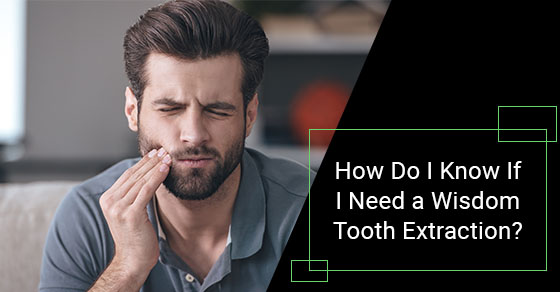Blog

How Do I Know If I Need a Wisdom Tooth Extraction?
Posted by Dr. Julie Boudreault On 23-10-2019
Do you often think about your wisdom teeth? If not, you’re not alone! For those of us not in the dental profession, it can be easy to forget all about out our third molars — there are four in total, with two on the top of your mouth and two on the bottom — because, if we’re honest, they don’t seem particularly useful.
In fact, some people’s wisdom teeth never even come through, and they live perfectly healthy lives without them. That being said, bad wisdom teeth gone unchecked can definitely cause big problems. Complications with wisdom teeth are so common that many dentists will recommend that their patients have them removed before symptoms have even emerged. If you haven’t had your wisdom teeth extracted, you may be wondering how you’ll know if you need an extraction.
In theory, wisdom teeth should come in a person’s late teen years or their early 20s. While this timeline tends to be accurate, the period of these final teeth coming in — pushing through the gums — is rarely a ‘straight forward’ process. Our mouths rarely have room to fit these four additional teeth, leading to crowding and infections.
When to Consider a Wisdom Tooth Extraction
You may need to visit a dentist immediately to consider wisdom tooth removal if you experience ongoing swelling, pain, or infections. Infections resulting from wisdom teeth may also lead to fevers and earaches.
Dentists will also consider removal if x-rays indicate that there will not be sufficient room for the third molars to grow in properly and that allowing them to grow in will cause crowding and damage to neighbouring teeth. In other instances, partially erupted wisdom teeth can become infected or become decayed as they are difficult to clean.
“Impacted” is a common term you will hear associated with problematic wisdom teeth. Let’s look at some of the common issues you can encounter with impacted wisdom teeth:
- Horizontal impaction
This occurs when a wisdom tooth grows in sideways at 90 degrees and pushes into the roots of the neighbouring tooth.
- Distoangular impaction
Distoangular impaction occurs when a wisdom tooth grows in at an angle towards the back of the mouth.
- Vertical impaction
This type of impaction occurs when a wisdom tooth is unable to break through the gums.
- Mesioangular impaction
Mesioangular impaction occurs when a wisdom tooth grows in at an angle towards the front of the mouth.
In addition to pain and infections, overcrowding as the result of an impacted tooth can also undo years of other costly dental work. This means that if you ever had braces to straighten your teeth, you may find yourself with crooked teeth all over again.
If a severely angled tooth goes completely unchecked, it can even create a fluid-filled cyst in the jawbone and eventually cause nerve damage. Although it is very rare, benign tumours can form from this, resulting in the need for surgery to remove compromised bone and tissue.
Lesser symptoms to consider as red flags for extraction include bad breath, headaches, earaches, toothaches, swollen and red gums, and an unpleasant taste in the mouth.
How can a dentist help me make a decision?
You may be wondering how dentists can tell that a wisdom tooth is problematic, especially if you don’t go into an appointment with any alarming symptoms or have no evidence of your wisdom teeth erupting at all.
The great thing about modern technology is that dentists can take a series of x-rays to discover what’s going on — and predict what will be going on — beneath the surface of the gums. Within minutes, you can see results presented on a monitor, where your dentist can point out troubling signs.
For instance, a horizontally impacted tooth may never show itself on the surface, but if a dentist catches signs of this growth pattern early on, you can nip future problems in the bud with preventative extraction.
According to the Canadian Dental Association, as of 2013, upwards of 7 million Canadians experienced some form of wisdom tooth impaction. Given the high likelihood of complications, it’s hardly surprising that sometimes even patients will request that all wisdom teeth be extracted as a precautionary measure. Your dentist can tell you the pros and cons of extraction so that you can make an informed decision.
Planning for Wisdom Tooth Extraction
Once you’ve visited a dentist and had your examination, you should have a clearer idea of your options and timelines If you have no immediate cause for concern, but your dentist recommends that extraction is done to keep your mouth pain-free, you may still want to consider scheduling an appointment sometime soon.
In this case, you can factor in the best time for you to undergo the procedure, such as during a holiday period where getting bed rest won’t upset your regular schedule.
If you’ve gone to the dentist due to an infection or pain related to your wisdom teeth, it’s important to heed your dentist’s advice regarding the urgency for extraction. While the timing may not be as convenient for you, waiting too long for an extraction can cause further problems down the road. You may be prescribed antibiotics to fight an infection prior to the extraction procedure.
While you wait for your appointment, you can help keep the site cleaner by gargling a mix of water and salt several times a day and using mouthwash to minimize bad breath and the spread of germs.
For more information about wisdom teeth extraction, call Milltown Dental at 905-878-8528 or contact us here.

